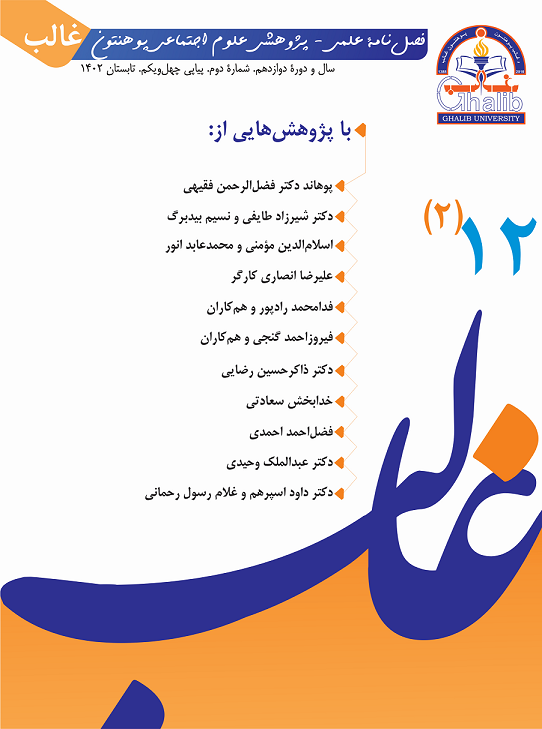Confrontation of Wisdom and Love in Haydari Wojudi’s Poem
(با آوردههایی از مولانا)
DOI:
https://doi.org/10.58342/ghalibqj.V.12.I2.5Keywords:
Heydari Wojudi, mysticism and Sufism, love, wisdomAbstract
Heydari wojudi is one of the Afghanistan greatest modern mystic poets; His poetical work is considered the most valuable mystical work that was written in all poetic formats (except the contemporary one) and has achieved an important and prominent position in the field of mysticism. One of the fundamental issues in mysticism is the confrontation between wisdom and love; therefore, it is necessary to examine this important issue in his poetry. The general purpose of this research was to get an answer to this question: What is Heydari's existential view about wisdom and love? This research is based on the objective, fundamental, qualitative data, and on analytical-critical method. The findings of the research show that: "confrontation of wisdom and love" in existential poetry is clear. He categorized the wisdom into two categories: partial and faith (love), and he believes that the partial wisdom is illusory, it cannot know the truth; therefore, it is not possible to know the truth only with the wisdom of faith (love); it is also believed that it is not possible to understand the truth through analogy and reasoning because the source of wisdom is reason, and reason is influenced by its surroundings.
References
قرآن کریم.
احمدی نقدهی، جعفر. (1398). تقابل و تعامل عقل و عشق در مثنوی مولوی و حدیقۀ سنایی. رسالۀ دکتری. بهرهنمایی: پرویز محمدی. دانشگاه ادیان و مذاهب. ایران: قم.
استعلامی، محمد. (1399). فرهنگنامۀ تصوف و عرفان. چ دوم. تهران: فرهنگ معاصر.
برزگرخالقی، محمدرضا. (1398). شاخ نبات. چ دهم. تهران: زوّار.
حیدری وجودی، غلامحیدر. (1399). دیوان حیدری وجودی. کابل: انجمن دوستداران بیدل.
دهخدا، علی اکبر. (1337). لغتنامۀ دهخدا. تهران: دانشگاه تهران.
زمانی، کریم. (1399). شرح جامع مثنوی معنوی. چ پنجاهوچهارم. تهران: اطلاعات.
سجادی، سیدجعفر. (1383). فرهنگ اصطلاحات و تعبیرات عرفانی. چ هفتم. تهران: انتشاراتِ طهوری.
سعدی، مصلحالدین بن عبدالله. (1385). کلیات سعدی. به تصحیح محمد علی فروغی. تهران: هرمس.
سعیدی، حسن؛ نصیری، ولیالله. (1391). «عقل از دیدگاه مولانا». ایران: فصلنامۀ فلسفه و کلام اسلامی/ آیینۀ معرفت. دانشگاه شهید بهشتی. 33(4). صص: 25- 41.
سنایی، مجدودبن آدم. (1388). دیوان حکیم ابوالمجدمجدودبن آدم. به سعی و اهتمام مدرس رضوی. چ هفتم. تهران: سنایی.
ضیائی، انور. (1389). «تقابل عقل و عشق در مثنوی معنوی مولانا و حدیقۀ سنایی». ایران: زیباییشناسی ادبی. سال 1(2) صص: 119-140.
ماحوزی، رضا. (1388). «عقل جزئی و کلی در اندیشۀ مولانا». ایران: پژوهشنامۀ فرهنگ و ادب. سال پنجم و ششم. 9 (2). صص: 302- 316.
محمدپور دهکردی، سیما. (1391). کرامت انسان از دیدگاه ملا صدرا و کانت. قم: مؤسسۀ بوستان کتاب.
مولوی، جلالالدین محمد. (1376 الف). کلیات شمس تبریزی. تهران: امیرکبیر.
مولوی، جلالالدین محمد. (1380 ب). مثنوی معنوی. چ چهارم. تهران: پیمان.
نجم رازی، عبدالله بن محمد. (1393). رسالۀ عقل و عشق. چ ششم. به اهتمام و تصحیح تقی تفضلی. تهران: علمی و فرهنگی.
نیازکار، فرح. (1385). شرح غزلها سعدی. تهران: هرمس.
References
The Holy Quran. (Arabic)
Ahmadi Naqdehi, Jafar. (2018). The confrontation and interaction of Intellect and love in Mawlawi's Masnavi and Hadigeh Sanai. PhD dissertation, to guide: Perwiz Mohammadi, University of Religions and Religions, Iran, Qum. (Persian)
Barzgar Khalaqi, Mohammad Reza. (2018). Shakh Nabat. 10th edition. Tehran: Zawar. (Persian)
Dehkhoda, Aliakber.(1337). Dictionary of Dehkhoda. Tehran: Tehran University.
Heydari Wajodi,Gholam Haider. (2019). Divan-e- Heidari Wajodi. Kabul: Bidel Lovers Association. (Persian)
Istilami, Mohammad. (2019). Dictionary of Sufism and mysticism. 2nd edition, Tehran. (Persian)
Mahouzi, Reza. (2008). “Partial and general reason in Mowlana thought”. Research Journal of Farhang and Adab. 5th and 6th year, winter 2008 and spring and summer 2009, number 9, volume 2, pp: 302-316. (Persian)
Mohammadpoor Dehkordi, Sima. (2011). Human dignity from the point of view of Mulla Sadra and Kant. Qom: Bostan Kitab Institute. (Persian)
Mowlavi, Jalaluddin Mohammad. (1996). Kulyat Shams Tabrizi. Tehran: Amirkabir. (Persian)
Mowlavi, Jalaluddin Mohammad. (2000). Masnavi Manavi. 4th edition, Tehran: Peyman. (Persian)
Najm Razi, Abdullah ibin Muhammad. (2013). epistle on Intellect and Love. 6th edition, under the care and correction of Taghi Tafazuli, Tehran: Elmi and Farhangi Publishing Company. (Persian)
Niazkar, Farah. (2005). explanation on Saadi's poetry. Tehran: Hermes. (Persian)
Saadi, Mosleh al-Din ebin Abdullah. (2005). Kulyat-e- Saadi. edited by Mohammad Ali Foroughi. Tehran: Hermus. (Persian)
Saidi, Hassan; Nasiri, Wali Allah. (2011). “Intellect from Molana point of view”. Islamic Philosophy and Theology Quarterly/ Ayane Marafet. Shahid Beheshti University. Year 11, Number 33, Winter 2011, pp: 25-41. (Persian)
Sajjadi, Seyyed Jaafar (2003). Dictionary of Mystical Terms and Interpretations. 7th edition. Tehran: Tahori Publications. (Persian)
Sanai, Majdod Ibn Adam. (2001). Diwan Hakim Abol al-Majdamajdod Ibn Adam. by the endeavor of Modares Razavi. 7th edition. Tehran: Sanai. (Persian)
Zamani, Karim. (2019). the comprehensive description of Masnavi Manavi. fifty-fourth edition. Tehran: Itlahat. (Persian)
Ziyai, Anwar. (2018). “Confrontation of Intellect and Love in the masnavi of Mowlana and Hadiqeh Sana'I”. Andisheh-Hai Adabi Quarterly, Year 1, Number 4, Summer2018, pp: 119-140. (Persian)
Downloads
Published
How to Cite
Issue
Section
License
Copyright (c) 2023 Ghalib Journal

This work is licensed under a Creative Commons Attribution 4.0 International License.













